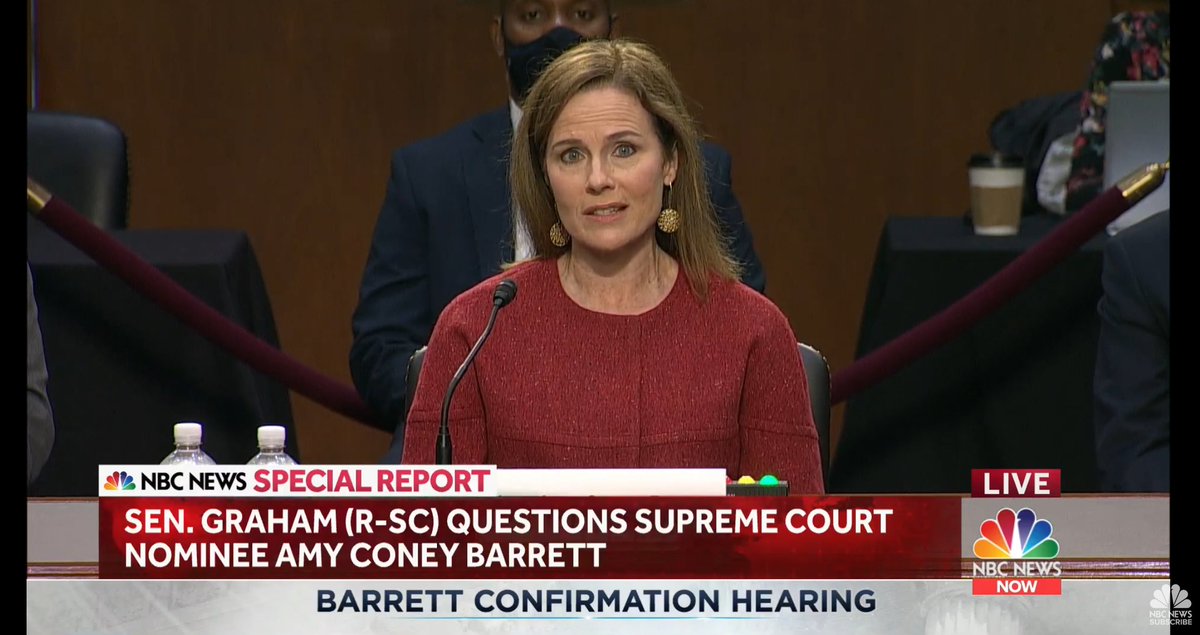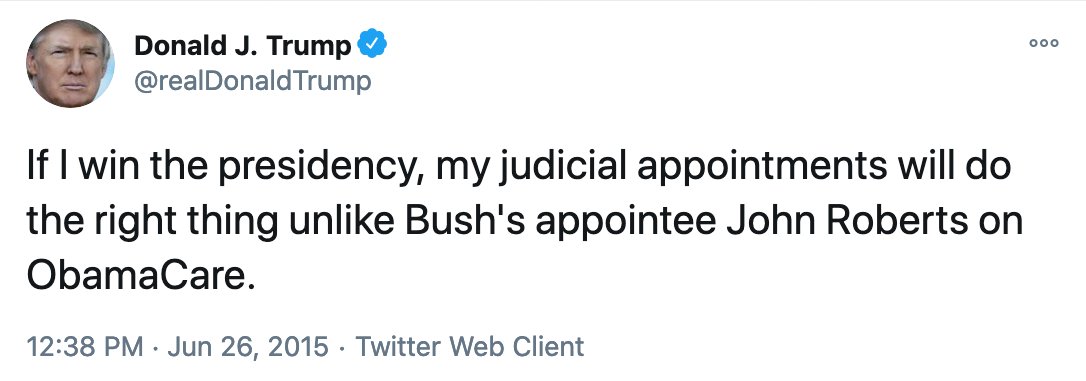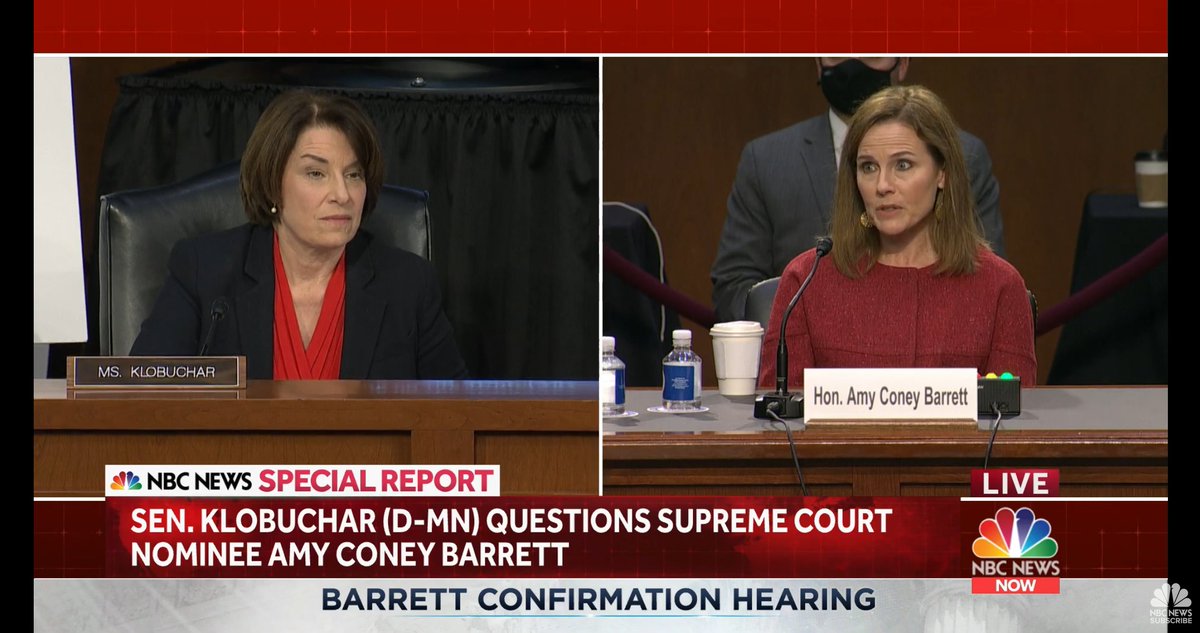Amy Coney Barrett on originalism: "That means that I interpret the Constitution as a law... I understand it to have the meaning that it had at the time people ratified it. That meaning doesn& #39;t change over time and it& #39;s not up to me to update it or infuse my policy views into it."
Amy Coney Barrett says Antonin Scalia was a mentor to her but if she& #39;s confirmed, "You wouldn& #39;t be getting Justice Scalia, you would be getting Justice Barrett."
Amy Coney Barrett says a "super precedent" means to her "a precedent that is so well established that it would be unthinkable that it would ever be overruled."
Amy Coney Barrett re: Brown v. Board of Education says there& #39;d have to be a case and controversy for the Supreme Court to revisit it.
"I do not see that happening any time soon."
"I do not see that happening any time soon."
Amy Coney Barrett says she owns a gun, but says she can fairly decide a case on guns.
Asked by Graham if she can set aside her Catholic beliefs when deciding cases, Barrett says, "I can."
Lindsey Graham jokes that he may move closer to the Democrats& #39; view on money in politics given what& #39;s happening in his South Carolina race: "There& #39;s a lot of money being raised in this campaign. I& #39;d like to know where the hell some of it& #39;s coming from."
Barrett downplays the prospect of revisiting Obergefell, saying the "most likely result" is that a case on same-sex marriage doesn& #39;t make it to the Supreme Court. But she says if lower courts flout precedent it could come back up.
Amy Coney Barrett talks about the Obamacare case: "There& #39;s not precedent on the issue that& #39;s coming up before the court. It turns on a doctrine called severability, which was not an issue in either of the two big Affordable Care Act cases."
Amy Coney Barrett, under questioning from Lindsey Graham, doesn& #39;t say if she& #39;ll recuse herself from the Obamacare case.
"Recusal itself is a legal issue," she says, promising to follow the appropriate procedures in each case.
"Recusal itself is a legal issue," she says, promising to follow the appropriate procedures in each case.
Amy Coney Barrett says she is "aware of a lot of the caricatures floating around" about her.
Amy Coney Barrett declines twice to say if she agrees with her mentor Antonin Scalia that Roe v. Wade was wrongly decided. She says that would "signals to litigants that I might tilt" one way or the other on a case.
And there& #39;s the expected dodge from Barrett on Roe and Casey.
"It would be comforting to you to have an answer," she tells Dianne Feinstein, but insists it& #39;d be improper to weigh in on those precedents.
"It would be comforting to you to have an answer," she tells Dianne Feinstein, but insists it& #39;d be improper to weigh in on those precedents.
Barrett says "I will obey all the rules of stare decisis" on Roe or Casey or any other precedent that comes before he on the Supreme Court and could be overruled.
"Heller leaves room for gun regulations," Amy Coney Barrett says of the & #39;08 case that found an individual right to own a gun at home. She says the right is not "absolute" but doesn& #39;t offer her view on the parameters of it.
Barrett says the ACA lawsuit is "is not a challenge to pre-existing conditions coverage or to the lifetime maximum relief cap," says the Supreme Court& #39;s decision "should be determined by the law" and it& #39;s up to Congress to sort through the "policy consequences."
Amy Coney Barrett says the ACA lawsuit headed to the Supreme Court is "not the same issue" as the previous two lawsuits (NFIB and King) that she expressed opinions on.
"The canons of judicial conduct would prohibit me from expressing a view" on the upcoming one, she says.
"The canons of judicial conduct would prohibit me from expressing a view" on the upcoming one, she says.
Amy Coney Barrett: "As a person, I have general belief that racism is abhorrent."
Dianne Feinstein: "Well, I think we would all agree with that."
Dianne Feinstein: "Well, I think we would all agree with that."
Amy Coney Barrett doesn& #39;t say if she agrees with her mentor Antonin Scalia& #39;s legal positions against same-sex marriage. "I& #39;m not going to express on view on whether I agree or disagree with Justice Scalia," she says, and evokes Ginsburg& #39;s no-hints-or-forecasts standard.
Chuck Grassley asks Amy Coney Barrett if her "goal" is to repeal the ACA and whether anyone in the Trump administration asked her about the forthcoming case.
BARRETT: "Absolutely not. I was never asked and if I had been that would& #39;ve been a short conversation."
BARRETT: "Absolutely not. I was never asked and if I had been that would& #39;ve been a short conversation."
Amy Coney Barrett, on the ACA and "any election dispute that may or may not arise," says she has "had no conversation with the president or any of his staff on how I might rule." She says it& #39;d be a "gross violation of judicial independence" and she& #39;s not pre-committed.
Amy Coney Barrett, discussing potential 2020 election disputes, says any decision to recuse herself would be a lengthy process involving law and procedure. Doesn& #39;t commit either way. "I can& #39;t offer an opinion on recusal without short-circuiting that entire process," she says.
Barrett: "It would be a complete violation of the independence of the judiciary for anyone to put a justice on the court as a means of obtaining a particular result."
Trump, however, has not been shy about connecting his judicial picks to policy outcomes.
Trump, however, has not been shy about connecting his judicial picks to policy outcomes.
Amy Coney Barrett: "My personal views don& #39;t have anything to do with how I would decide cases, and I don& #39;t want anybody to be unclear about that."
Amy Coney Barrett, asked by Dick Durbin about her criticisms of the Supreme Court& #39;s past rulings for the ACA, says: "I am not hostile to the ACA. I am not hostile to any statute that you pass."
Dick Durbin now asking Amy Coney Barrett about her legal opinion that being a felon is not enough for the government to stop a person from lawfully owning a gun.
Durbin accusing conservatives of hypocrisy on "activist judges" who legislating from the bench, saying Republican-picked judges have no problem overturning gun limits, campaign finance rules and voting rights protections passed by political branches.
Amy Coney Barrett: "To the extent, Senator Durbin, that you& #39;re suggesting that I have some sort of agenda on felon voting rights or guns or campaign finance or anything else, I can assure you and the whole committee that I do not."
Amy Coney Barrett says again she is uncommitted in the ACA case: "To the extent that there& #39;s a suggestion that I have an agenda, that I want to strike down people& #39;s protection for pre-existing conditions conditions, that& #39;s just not true. I& #39;ve never taken that position."
And the Senate Judiciary Committee has recessed until 12:45p ET. I& #39;ll continue posting updates in this thread when they& #39;re back (please mute the thread if it& #39;s too much!). Thanks to everyone else following along.
Sheldon Whitehouse says the reason people think Amy Coney Barrett will rule against ACA, abortion rights and same-sex marriage is that Trump and/or GOP platform have explicitly said that& #39;s what his Supreme Court appointees would do.
"Don& #39;t act as if we& #39;re making this stuff up."
"Don& #39;t act as if we& #39;re making this stuff up."
Ted Cruz tells Amy Coney Barrett: "You have declined to give an opinion on a matter that might be pending before the court. That is of course the same answer every sitting justice has given when he or she was sitting in the same chair you are."
Amy Klobuchar: "This hearing is not normal. It is a sham. It is a rush to put in a justice."
Amy Klobuchar, who brought a blow-up poster of Trump& #39;s tweet, gets Amy Coney Barrett to expand on her past remarks sympathizing more with the dissent in both the pro-ACA rulings, NFIB (in 2012) and King (in 2015).
Amy Klobuchar tells Amy Coney Barrett: "The American people have to understand that you would be the polar opposite of Justice Ginsburg. She and Justice Scalia were friends, yes, but she never embraced his legal philosophy."
Klobuchar peppers Barrett with questions about the right to vote and whether she agrees with Ginsburg& #39;s dissent in Shelby County, which gutted preclearance in the Voting Rights Act. Barrett sidesteps twice: "Since I didn’t write Shelby, I can& #39;t really talk about it."
KLOBUCHAR: Judge Barrett, under federal law is it illegal to intimidate voters at the polls?
BARRETT: Sen. Klobuchar, I can& #39;t characterize the facts in a hypothetical situation and I can& #39;t apply the law to a hypothetical set of facts. I can only decide cases as they come to me.
BARRETT: Sen. Klobuchar, I can& #39;t characterize the facts in a hypothetical situation and I can& #39;t apply the law to a hypothetical set of facts. I can only decide cases as they come to me.
Barrett doesn& #39;t say if a reasonable person could feel intimidated by the presence of armed civilian groups at the polls. She says that& #39;s eliciting either a legal or personal opinion from her and "it& #39;s not something really that& #39;s appropriate for me to comment on."
Amy Coney Barrett says Brown v. Board is a "super precedent" that practically can& #39;t be overruled. Klobuchar asks: Is Roe a "super precedent"? Barrett says that "Roe doesn& #39;t fall in that category" because it& #39;s "not a case that everyone has accepted."
Barrett says the view that Roe isn& #39;t a super precedent "doesn& #39;t mean that Roe should be overruled," but rather that it isn& #39;t as widely accepted as settled as cases like Marbury v. Madison and Brown v. Board. She doesn& #39;t say one way or another if Roe should be eliminated.
Ben Sasse vents about Dem tactics to "demonize" GOP-picked judges with "focus grouped" lines. "The argument is: & #39;American people, be really, really scared, the person sitting before us, obviously hates people and wants sick people to die and not have health care coverage.& #39;"
Ben Sasse, not hiding his contempt for the ACA questions, suggests Amy Coney Barrett will not be the "queen of all health care" if she gets on the Supreme Court.
Amy Coney Barret doesn& #39;t commit to recusal in a case about 2020 election dispute: "I certainly hope that all members of the committee have more confidence in my integrity than to think I would allow myself to be used as a pawn to decide this election for the American people."
Thom Tillis advises Amy Coney Barrett to "treat social media like roadkill."
"Just don& #39;t look at it, because if you do, you& #39;ll regret it."
"Just don& #39;t look at it, because if you do, you& #39;ll regret it."
"Turning to the topic of agency rule-making — really sexy topic," Joni Ernst says, as she and Barrett share a laugh.
Un-sexy but extremely important issue on which a 6-3 Court could curtail governing options via regulation.
Un-sexy but extremely important issue on which a 6-3 Court could curtail governing options via regulation.
Cory Booker asks Amy Coney Barrett if a president has the power to pardon himself for past or future crimes. She says that& #39;s a legal/constitutional question and she can& #39;t offer hints or forecasts on this and other issues that could appear before the court.
Kamala Harris begins her questioning with an extended history of Republican attempts to eliminate the ACA and the impacts of them potentially succeeding. Which of course brings her to Amy Coney Barrett, who she depicts as their Trojan horse to invalidate it through the courts.
Kamala Harris mentions the estimated number of Americans in TX, SC, NC, IA who would lose insurance coverage if the ACA is struck — which just so happen to be the home states of four Republican senators on the Judiciary Committee facing re-election.
Amy Coney Barrett, under questioning from Kamala Harris, says she doesn& #39;t "recall seeing or hearing those statements" from President Trump promising to pick judges who rule against the ACA.
"I don& #39;t recall hearing about or seeing such statements."
"I don& #39;t recall hearing about or seeing such statements."
Kamala Harris: "You& #39;ve already opined the constitutionality of the Affordable Care Act. And that position satisfied the president& #39;s promise to only nominate judges who would tear down the Affordable Care Act." Tells Barrett there& #39;s a "reasonable question about your impartiality."
Barrett says she has "never made a commitment" on how she& #39;d rule in the ACA case. "I& #39;ve never been asked to make such a commitment."
Barrett explains how she sees ACA case: "Question would be figuring out whether Congress, assuming that the mandate is unconstitutional now, whether that consistent with your intent...would permit the act to stand or whether the flawed portion of it could just be excised out."
Amy Coney Barrett says the question of whether invalidation of the individual mandate should lead to the entire ACA being wiped out is "a question of what Congress wanted in the statute."
Kamala Harris tells Barrett that Ginsburg, who she has invoked multiple times today "was far more forthcoming at her hearing about the essential rights of women."
Kamala Harris: "I would suggest that we not pretend that we don& #39;t know how this nominee views a woman& #39;s right to choose and make her own health care decisions."
Amy Coney Barrett, asked about the 9th Amendment, says it was "famously described by Judge Bork as an ink blot."
(Is that the first Bork mention at this hearing?)
(Is that the first Bork mention at this hearing?)
Aaaaand that& #39;s it for Day 2.

 Read on Twitter
Read on Twitter








